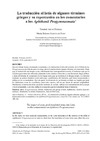Please use this identifier to cite or link to this item:
https://accedacris.ulpgc.es/jspui/handle/10553/55815
| Title: | La traducción al latín de algunos términos griegos y su repercusión en los comentarios a los "Aphthonii Progymnasmata" | Other Titles: | The impact of some greek translated terms into Latin on the commentaries on Aphthonii Progymnasmata | Authors: | Arcos Pereira, Trinidad García de Paso Carrasco, María Dolores |
UNESCO Clasification: | 620205 Retórica | Keywords: | Progymnasmata Fábula Traducción del griego al latín Aphthonius Alardus Aemstelredamus, et al |
Issue Date: | 2015 | Journal: | Cuadernos de filología clásica. Estudios latinos | Abstract: | En este trabajo hemos examinado comentarios a la traducción al latín del ejercicio de la Fábula de los Progymnasmata de Aftonio para ver cómo afecta la traducción de algunos términos al comentario. Dado que, al traducir de una lengua a otra, difícilmente hay correspondencia exacta, el traductor opta por la solución que estima más adecuada, primando ciertos matices sobre otros y, con frecuencia, llega, incluso, a dotar al término de acepciones en la lengua meta que no existían en la lengua origen. La elección realizada no parece obedecer a otra razón que a preferencias del traductor, pero tiene consecuencias e influye en los comentaristas. Por otra parte, la existencia de un término acuñado no impide que tanto los traductores como los escoliastas creen otros nuevos, tal vez por deseo de mostrar originalidad.
Finalmente, la traducción tiene una doble vertiente: de un lado, influye en el entendimiento del concepto y en el comentario, y, de otro, refleja la concepción que de la realidad tiene el traductor. In this work, we have analysed commentaries to the Latin translation of the exercise of the fable of Aphthonius’ Progymnasmata in order to check how the translation of some terms may affect the commentary. Since in the process of translation from one language into another it is very difficult to find exact equivalence, the translator makes the choice he considers most adequate, giving priority to some semantic nuances over other ones, and, sometimes, he even provides the term in the target language with meanings that were not present in the source language. This choice seems to respond only to the translator’s preferences but it has consequences and it influences on the commentators. Moreover, the previous existence of an already coined term does not prevent translators and scholiasts from creating new ones, maybe eager to be original. Finally, the effect of translation is twofold: on the one hand, it affects the way the concept is understood and the commentary, and, on the other hand, it reflects the translator’s view of reality |
URI: | https://accedacris.ulpgc.es/handle/10553/55815 | ISSN: | 1131-9062 | DOI: | 10.5209/rev_CFCL.2015.v35.n2.51102 | Source: | Cuadernos de filología clásica: Estudios latinos [ISSN 1131-9062], v. 35 (2), p. 319-336 | URL: | http://dialnet.unirioja.es/servlet/articulo?codigo=5357759 |
| Appears in Collections: | Artículos |
Page view(s) 5
302
checked on Jan 15, 2026
Download(s)
195
checked on Jan 15, 2026
Google ScholarTM
Check
Altmetric
Share
Export metadata
Items in accedaCRIS are protected by copyright, with all rights reserved, unless otherwise indicated.
